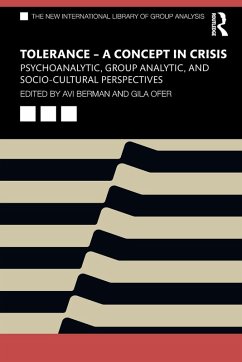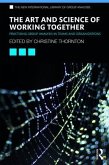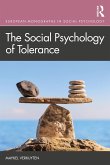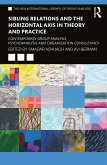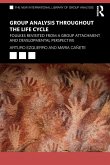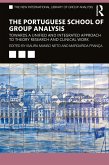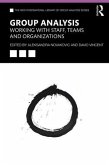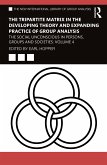This book examines tolerance as a concept under crisis, exploring its origin and functions, and how it can be at risk of replacement by moral intolerance or retributive justice in turbulent societies.
Tolerance - A Concept in Crisis considers the contributions that can be made to understanding and elaborating tolerance, and its counterpart intolerance, by psychoanalysis and group analysis. The contributors, representing a range of countries, backgrounds, and specialisms, consider five key themes: conceptual and emotional challenges, tolerance and psychoanalysis, tolerance and group analysis, tolerance and the socio-political, and tolerance and intolerance in organizations and institutes. The project suggests that tolerance is an outcome of developmental processes (emotional, intrapsychic, intersubjective, and social) to agree and contain disagreement as part of mutual belonging. It also considers how it might be taken too far. The concept of tolerance is examined through its valid contributions to diversity and reduction of discrimination, promoting reflexive scepticism, critical pluralism, and durable forgiveness.
Tolerance - A Concept in Crisis will be of great interest to psychoanalysts and group analysts facing issues of conflict and its resolutions, as well as other professionals who are seeking new perspectives on tolerance.
Tolerance - A Concept in Crisis considers the contributions that can be made to understanding and elaborating tolerance, and its counterpart intolerance, by psychoanalysis and group analysis. The contributors, representing a range of countries, backgrounds, and specialisms, consider five key themes: conceptual and emotional challenges, tolerance and psychoanalysis, tolerance and group analysis, tolerance and the socio-political, and tolerance and intolerance in organizations and institutes. The project suggests that tolerance is an outcome of developmental processes (emotional, intrapsychic, intersubjective, and social) to agree and contain disagreement as part of mutual belonging. It also considers how it might be taken too far. The concept of tolerance is examined through its valid contributions to diversity and reduction of discrimination, promoting reflexive scepticism, critical pluralism, and durable forgiveness.
Tolerance - A Concept in Crisis will be of great interest to psychoanalysts and group analysts facing issues of conflict and its resolutions, as well as other professionals who are seeking new perspectives on tolerance.
'It is good to see a book on tolerance at this time when grey clouds threatening war are once again gathering over various parts of the globe. Tolerance and working with others have been the prime asset that has enabled the human race to succeed so emphatically. At the same time, nothing is perfect. We all have to tolerate imperfection and difference and indeed intolerance. Such prejudices unleash forces that undermine us with dismissiveness, ideology, and bigotry. Avi Berman and Gila Ofer have worked hard to gather authors with many important perspectives on the hidden unconscious turbulence which erupts in uncontrolled, ill-understood ways in our many different societies. It is essential that in the twenty-first century, we reflect on these potentially disastrous storms.'
R.D. Hinshelwood, Professor Emeritus, University of Essex, UK
'A thought-provoking collection of papers that deepened my understanding of Tolerance--a psychological concept that is not easy to grasp in its nuance and sophistication and absorb into one's sensibility. An international group of scholarly clinicians approached tolerance from a number of therapeutic, geographic, moral, and political perspectives. Many contributions are deeply personal and reached me on that relational level.'
Richard M. Billow, Ph.D., Clinical Professor, Derner Postgraduate Programs; former director, Adelphi Postgraduate Group Program; author, Richard M. Billow's Selected Papers on Psychoanalysis and Group Process: Changing Our Minds (editor T. Slonim)
'Written by a diverse group of international experts, this book is an outstanding combination of different contemporary perspectives onto the concept of tolerance. It fills an important gap in theory and practice of development psychology, psychoanalysis, group analysis and politics (!) in these polarized times. The authors and editors succeeded in creating a fantastic blueprint, which the world really needs in view of the Kremlin's aggressive war against Ukraine, the competition between political systems and the fight of psychoanalytic institutes against their progredient insignificance. But blind tolerance, like epistemic mistrust, leads both individually and socio-politically to a dead end. In this respect, this book is also a wake-up call.'
Ulrich Schultz-Venrath, Prof. Dr. med., Professor of Psychosomatics and Psychotherapy (University of Witten/Herdecke),working in private practice as psychoanalyst (DPV/IPA) and training group analyst (D3G/EFPP/GASI)
'In this Anthropocene era, there has never been a more important time for widespread understanding of mankind's own psychology. Central to our very survival is the issue of tolerance, over-tolerance, and the not tolerating of destructiveness in ourselves and others.
This is a wonderful collection of thought-provoking essays that range from developmental psychology to individual, dyadic, group, and societal psychology. All the essays are steeped in psychoanalytic studies and reflections.
The editors and authors are to be congratulated for producing this book. It deserves a very broad readership as part of the urgent need for the psychoanalytic field to play a greater part in bringing its understanding to a wider public in the interest of mankind's self-preservation.'
Brian Martindale, Honorary President of the European Federation of Psychoanalytic Psychotherapy
'In a moment when expectations regarding democratic world diminished, stressing uncertainty, polarization and fear this book offers an essential and bona fide analysis of the concept of tolerance. Drawing on transdisciplinary research and exploring psychoanalytical, group analytical, sociocultural and organizational dimensions of the theme, the editors and authors from various countries permit an all-encompassing reflection on a fundamental topic to understand our current turbulent times.'
Carla Penna, PhD, psychoanalyst and group analyst in Rio de Janeiro. Member of the Group Analytic Society international. Former president of the Brazilian Association of Group Psychotherapy
'Putting aside manic ideals of blissful harmony, Avi Berman and Gila Ofer turn their attention to the more human and more plausible attribute of tolerance. They have enlisted a number of distinguished contributors who compare and contrast tolerance with forgiveness, mutual recognition, and acceptance of difference. Together they elucidate such phenomena in a variety of contexts, ranging from groups, organizations, mobs, and, to wit, psychoanalytic associations. Given the radical demographic shifts, inter-ethnic conflicts, and other forms of sociopolitical schisms in our world of today, Berman and Ofer's book is of keen and urgent importance indeed.'
Salman Akhtar, MD, Professor of Psychiatry, Jefferson Medical College; Training & Supervising Analyst, Psychoanalytic Center of Philadelphia
R.D. Hinshelwood, Professor Emeritus, University of Essex, UK
'A thought-provoking collection of papers that deepened my understanding of Tolerance--a psychological concept that is not easy to grasp in its nuance and sophistication and absorb into one's sensibility. An international group of scholarly clinicians approached tolerance from a number of therapeutic, geographic, moral, and political perspectives. Many contributions are deeply personal and reached me on that relational level.'
Richard M. Billow, Ph.D., Clinical Professor, Derner Postgraduate Programs; former director, Adelphi Postgraduate Group Program; author, Richard M. Billow's Selected Papers on Psychoanalysis and Group Process: Changing Our Minds (editor T. Slonim)
'Written by a diverse group of international experts, this book is an outstanding combination of different contemporary perspectives onto the concept of tolerance. It fills an important gap in theory and practice of development psychology, psychoanalysis, group analysis and politics (!) in these polarized times. The authors and editors succeeded in creating a fantastic blueprint, which the world really needs in view of the Kremlin's aggressive war against Ukraine, the competition between political systems and the fight of psychoanalytic institutes against their progredient insignificance. But blind tolerance, like epistemic mistrust, leads both individually and socio-politically to a dead end. In this respect, this book is also a wake-up call.'
Ulrich Schultz-Venrath, Prof. Dr. med., Professor of Psychosomatics and Psychotherapy (University of Witten/Herdecke),working in private practice as psychoanalyst (DPV/IPA) and training group analyst (D3G/EFPP/GASI)
'In this Anthropocene era, there has never been a more important time for widespread understanding of mankind's own psychology. Central to our very survival is the issue of tolerance, over-tolerance, and the not tolerating of destructiveness in ourselves and others.
This is a wonderful collection of thought-provoking essays that range from developmental psychology to individual, dyadic, group, and societal psychology. All the essays are steeped in psychoanalytic studies and reflections.
The editors and authors are to be congratulated for producing this book. It deserves a very broad readership as part of the urgent need for the psychoanalytic field to play a greater part in bringing its understanding to a wider public in the interest of mankind's self-preservation.'
Brian Martindale, Honorary President of the European Federation of Psychoanalytic Psychotherapy
'In a moment when expectations regarding democratic world diminished, stressing uncertainty, polarization and fear this book offers an essential and bona fide analysis of the concept of tolerance. Drawing on transdisciplinary research and exploring psychoanalytical, group analytical, sociocultural and organizational dimensions of the theme, the editors and authors from various countries permit an all-encompassing reflection on a fundamental topic to understand our current turbulent times.'
Carla Penna, PhD, psychoanalyst and group analyst in Rio de Janeiro. Member of the Group Analytic Society international. Former president of the Brazilian Association of Group Psychotherapy
'Putting aside manic ideals of blissful harmony, Avi Berman and Gila Ofer turn their attention to the more human and more plausible attribute of tolerance. They have enlisted a number of distinguished contributors who compare and contrast tolerance with forgiveness, mutual recognition, and acceptance of difference. Together they elucidate such phenomena in a variety of contexts, ranging from groups, organizations, mobs, and, to wit, psychoanalytic associations. Given the radical demographic shifts, inter-ethnic conflicts, and other forms of sociopolitical schisms in our world of today, Berman and Ofer's book is of keen and urgent importance indeed.'
Salman Akhtar, MD, Professor of Psychiatry, Jefferson Medical College; Training & Supervising Analyst, Psychoanalytic Center of Philadelphia

